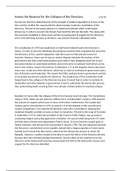Assess the Reasons for the Collapse of the Directory 4/10/18
Overall, the Directory failed because of the strength of political opposition in France at the
time and the conflict this caused with the determinately moderate constitution of the
Directory. This led to increasing reliance on underhand methods which undermined
democracy in order to prevent the threats from both the left and the right. This, along with
the economic instability in these years and the increasing lack of support for the directory,
seen in the declining turnouts at elections, was why the Directory ultimately failed.
The constitution of 1795 had weaknesses in itself which helped lead to the Directory’s
failure. In order to prevent individuals becoming too powerful they separated the executive,
the Directory of Five, and the legislative, with the Council of 500 and the Council of
Ancients. However, there was no way to resolve disputes between the sections of the
government and they could easily paralyse each other if they disagreed which led to and
increased reliance on underhand methods and on the army to maintain itself which can be
seen in the various coups in this period. Furthermore, 1/3 of the deputies had to step down
every year, as did one of the directors, which led to a lack of continuity in government and a
lack of direction and leadership. This meant that little could get done in government and led
to increased resentment towards the Directory. The weaknesses of the constitution itself
helped lead to the collapse of the Directory because it meant that in order to maintain its
moderation and solve disputes in government it had to undermine the democratic process,
thus undermining itself, meaning that it was already a failure before its eventual collapse.
Royalism in France after the collapse of the Terror became much stronger. The Vendemiere
rising in 1795, which was put down by military force, and Brountier’s rising in 1796 showed
the amount of royalism which was in France at this time. Furthermore, the royalist had
massive gains in the election in 1797 so around 1/3 of the deputies in the councils were
royalsit sympathisers. This worried the Directory who were committed to retaining the
moderate Republic and did not want a return to monarchy. This led to the Coup of Fructidor
in September 1797 in which the president of the Council of 500, Pitegru, was accused of
contacting emigres and acting against the revolution. He was arrested along with 177 other
and fifty-three of them were deported to French Guina. To try to limit the royalist gains in
further elections, and electoral law was passed in January 1798. This was important because
the Directroy’s commitment to the republic clashed with a large proportion of what voters
wanted and it meant that they had to undermine the democratic process to retain the
Republic. However, royalism would not be able to cause the failure of the Directory directly
because they were divided amongst themselves, but the effort of the royalists led to the
Directory undermining itself meaning many people lost faith in the democratic process and
support for the directory dwindled.





